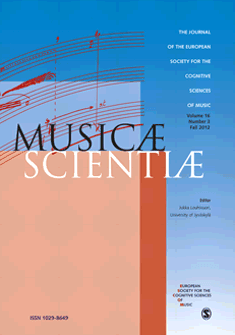
MUSICAE SCIENTIAE
Scope & Guideline
Connecting Melodies with Minds: A Scholarly Journey
Introduction
Aims and Scopes
- Interdisciplinary Research:
The journal fosters research that intersects various disciplines such as psychology, sociology, music education, and neuroscience, encouraging diverse methodologies and perspectives in understanding music. - Cognitive and Emotional Aspects of Music:
MUSICAE SCIENTIAE focuses on how music influences cognition and emotion, exploring topics such as music-induced emotions, music therapy, and the psychological effects of music listening. - Societal and Cultural Impact of Music:
The journal addresses the role of music in social cohesion, community engagement, and cultural identity, examining how music can foster connections within and between communities. - Educational Perspectives:
Research published in the journal often highlights innovative pedagogical approaches in music education, the development of musical skills, and the impact of music training on cognitive and emotional development. - Technological Innovations in Music:
The journal embraces studies that investigate the integration of technology in music practice, performance, and education, reflecting on how digital tools and platforms influence musical experiences.
Trending and Emerging
- Mental Health and Music Therapy:
There is a marked increase in research exploring the therapeutic benefits of music for mental health, particularly in areas such as anxiety, depression, and cognitive function, showcasing music's role as a powerful intervention tool. - Technology-Enhanced Music Experiences:
Studies examining the impact of technology on music creation, performance, and education are on the rise, reflecting the integration of digital tools in musical practices and the exploration of virtual music environments. - Music and Identity:
An emerging focus on how music shapes personal and cultural identities is evident, with research exploring the connections between music, social identity, and community engagement. - Emotional Responses to Music:
There is a growing interest in understanding the nuanced emotional responses elicited by music, including the role of empathy and emotional regulation in music listening experiences. - Participatory Music and Community Engagement:
Research highlighting the role of participatory music-making in fostering social cohesion and community well-being is becoming increasingly prominent, emphasizing music's potential for societal impact.
Declining or Waning
- Historical Analysis of Music:
Papers centered on historical analyses of music styles and trends are becoming less frequent, as the journal shifts towards more contemporary issues and applications of music research. - Traditional Music Education Methods:
Research focusing on conventional music teaching methodologies is diminishing, possibly in favor of innovative and technology-driven pedagogical approaches that reflect modern educational needs. - Music Theory and Analysis:
Theoretical explorations of music composition and analysis are less prominent in recent issues, indicating a potential waning interest in purely theoretical studies compared to applied music research. - Performance Practice in Classical Music:
While performance studies remain relevant, there seems to be a decline in the focus on classical performance practices, with greater emphasis now placed on diverse musical genres and contemporary performance contexts. - Music and Memory Studies:
Although still a significant area, research specifically targeting the relationship between music and memory recall is less visible, suggesting a shift towards broader cognitive and emotional engagements with music.
Similar Journals

Musicologist
Advancing Music Knowledge Through Innovative ResearchMusicologist is a premier academic journal dedicated to the exploration and analysis of music theory, history, and practice, published by the esteemed Trabzon University State Conservatory in Turkey. With an ISSN of 2618-5652, this journal has been a vital platform for scholars since its inception in 2019, reflecting a commitment to fostering innovative research in the field of music. Recognized for its quality, the journal currently holds a Q2 ranking in the music category for 2023, placing it within the top segments of its discipline, as evidenced by its position at #72 out of 180 in the Scopus rankings, representing the 60th percentile. Although the journal employs a traditional publication model, it serves as a crucial repository for contemporary musicological discourse, aiming to advance knowledge and understanding within a vibrant academic community. Musicologist is not only a resource for seasoned researchers but also an invaluable tool for students and professionals alike, nurturing a comprehensive appreciation of music as an art form and scholarly pursuit.
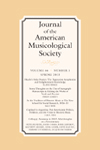
JOURNAL OF THE AMERICAN MUSICOLOGICAL SOCIETY
Pioneering insights in the art of music.JOURNAL OF THE AMERICAN MUSICOLOGICAL SOCIETY, published by University of California Press, is a prestigious peer-reviewed journal dedicated to advancing the field of musicology. With an ISSN of 0003-0139 and E-ISSN 1547-3848, this journal has been a cornerstone of scholarly communication since its inception in 1970 and continues to be relevant through 2024. Its esteemed standing is reflected in its Q2 ranking in the Music category and a respectable 71/180 ranking in the Arts and Humanities discipline, placing it in the 60th percentile among its peers. The journal provides an essential platform for researchers, professionals, and students to explore diverse topics in musicology, ranging from historical studies to contemporary analyses. While it does not currently offer Open Access options, its rigorous editorial standards ensure the publication of high-quality research that contributes significantly to the academic dialogue in music studies. With its address based in the United States at 155 Grand Ave, Suite 400, Oakland, CA 94612-3758, the journal remains a vital resource for those seeking to deepen their understanding of the complexities of music and its societal impacts.
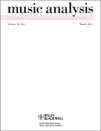
MUSIC ANALYSIS
Unlocking the Secrets of Musical InfluenceMUSIC ANALYSIS, published by WILEY, is a prestigious journal in the field of musicology, recognized for its critical contributions to the analysis of music and its myriad influences on culture and society. With an ISSN of 0262-5245 and an E-ISSN of 1468-2249, this journal has established itself as a vital resource for researchers, professionals, and students alike, boasting a Q1 ranking in the 2023 category of Music. As part of a highly competitive field, it ranks 70th out of 180 in the Arts and Humanities Music category on Scopus, positioning it within the 61st percentile. MUSIC ANALYSIS serves as an essential platform for innovative research and insightful discourse, engaging with musical theory, practice, and education from 1996 to 2024. Its commitment to fostering rigorous scholarship makes it indispensable for those seeking to deepen their understanding of music and its analytical frameworks. Although it does not offer Open Access options, its relevance and impact in the genre ensure accessibility through institutional subscriptions and university libraries.
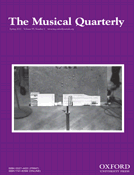
MUSICAL QUARTERLY
Navigating the Evolving Landscape of Music StudiesMUSICAL QUARTERLY, published by Oxford University Press Inc, is a distinguished journal in the field of music, with a publication history that stretches back to 1915. This esteemed journal, identifiable by its ISSN 0027-4631 and E-ISSN 1741-8399, provides a critical platform for scholarly discourse, analysis, and research in musicology and related disciplines, facilitating an understanding of both historical and contemporary musical practices. Although it operates without open access, it continues to attract a diverse readership of researchers, educators, and students alike, thanks to its well-curated articles and reviews that engage with music theory, history, and ethnomusicology. With a current Scopus rank of #119 out of 180 in the Arts and Humanities category and a 34th percentile ranking in Music, MUSICAL QUARTERLY plays a vital role in advancing knowledge and fostering collaboration within the music academic community. Its commitment to high-quality scholarship is reflected in its ongoing efforts to address the evolving landscape of music studies, making it an essential resource for anyone serious about exploring the rich tapestry of music scholarship.
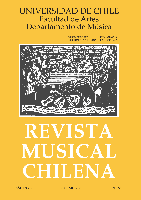
Revista Musical Chilena
Fostering Critical Dialogue in the World of MusicRevista Musical Chilena, an esteemed publication from the Faculty of Arts at Universidad de Chile, has been a pivotal platform in the field of music and cultural studies since its inception in 1945. With a commitment to open access, this journal promotes the dissemination of innovative research and critical discourse that bridges the gap between cultural theory and musical practice. Holding a notable Q2 ranking in both the Cultural Studies and Music categories as of 2023, it serves as a vital resource for scholars and professionals alike. The journal's inclusion in the Scopus database, with rankings that reflect its influence in the arts and humanities, underscores its significance in shaping the contemporary landscape of music studies. Given its convergence of research output from 2007 to 2024, Revista Musical Chilena continues to engage its audience with diverse scholarship that reflects Chilean musical heritage and global cultural dynamics.
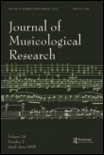
JOURNAL OF MUSICOLOGICAL RESEARCH
Contributing to the Evolution of Musicological DiscourseJOURNAL OF MUSICOLOGICAL RESEARCH, published by Taylor & Francis Ltd, is an esteemed platform that delves into the field of musicology, contributing to the ongoing dialogue in music research and scholarship since its establishment in 1979. With an ISSN of 0141-1896 and an E-ISSN of 1547-7304, this journal serves as a vital resource for researchers, professionals, and students, offering insights into diverse musicological topics. Although currently categorized in Q4 in Music with Scopus rankings placing it at #110 out of 180 in the Arts and Humanities field, its commitment to excellence and broader discourses in music studies is evident. The journal does not have Open Access options, yet it provides accessible content through reputable academic channels, fostering scholarly exchanges within the community. It aims to publish high-quality research that advances understanding of musical practices and cultural implications, making it a critical resource for those passionate about music and its myriad influences.
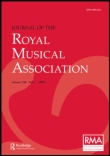
JOURNAL OF THE ROYAL MUSICAL ASSOCIATION
Cultivating a deeper understanding of musical artistry.JOURNAL OF THE ROYAL MUSICAL ASSOCIATION, published by Cambridge University Press, stands as a significant repository for innovative research and scholarly discourse within the field of music studies. Recognized for its contributions to the understanding of musical practices, theory, and history, this esteemed journal offers a platform for academics and researchers to disseminate their findings to a broad audience. With an ISSN of 0269-0403 and E-ISSN of 1471-6933, the journal has maintained a notable presence since its inception, merging insights from both traditional and contemporary musicology. It currently occupies a Q4 ranking in Music within the Scopus database, reflecting its inclusion within the arts and humanities landscape. While the journal traditionally operates under subscription access, its continuing commitment to advancing music scholarship ensures that it remains an essential resource for students, scholars, and practitioners alike, fostering greater understanding and appreciation of musical artistry from 1987 to the current era.

Resonancias
Fostering a Symphony of Scholarly Insights.Resonancias is a distinguished open-access journal published by the Pontificia Universidad Católica de Chile, dedicated to advancing the field of music studies. With an ISSN of 0717-3474 and an E-ISSN of 0719-5702, this journal has been promoting scholarly discourse in music since its transition to open access in 2014. Resonancias serves as a critical platform for researchers, professionals, and students alike, enabling them to disseminate knowledge and explore innovative perspectives in musicology. With its current Q2 ranking in the field of music as of 2023, and a Scopus ranking of #108 out of 180, this journal exemplifies its commitment to quality and impact within the academic community, fostering an accessible database of music research from Chile and beyond. Situated at AVENIDA VICUNA MACKENNA 4860, MACUL, SANTIAGO, CHILE, Resonancias not only promotes original research but also includes critical reviews, interviews, and essays that contribute to the rich tapestry of musical knowledge.

Malaysian Journal of Music
Diving Deep into the Heart of Malaysian MusicThe Malaysian Journal of Music is a distinguished academic publication dedicated to the exploration and advancement of music and cultural studies within the Southeast Asian context. Published by UNIV PENDIDIKAN SULTAN IDRIS, FACULTY OF MUSIC & PERFORMING ARTS, this journal contributes significantly to the field by disseminating high-quality research and scholarship related to both traditional and contemporary music practices in Malaysia and beyond. Since its inception in 2018, the journal has earned a Q3 categorization in both Cultural Studies and Music, reflecting its commitment to fostering a comprehensive understanding of these interdisciplinary areas. As of now, it ranks 90th out of 180 in the domain of Arts and Humanities focused on Music, positioning it firmly within the academic discourse. The Malaysian Journal of Music serves as an invaluable resource for researchers, professionals, and students alike, providing insights into the rich tapestry of music, culture, and their societal impacts. The journal is dedicated to open access publishing, ensuring that knowledge is shared widely and freely, further solidifying its role as a cornerstone for music scholarship in Malaysia.
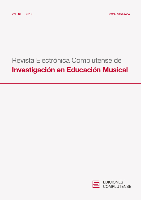
Revista Electronica Complutense de Investigacion en Educacion Musical-RECIEM
Connecting Scholars and Educators in Music PedagogyRevista Electronica Complutense de Investigacion en Educacion Musical (RECIEM) is a distinguished open-access journal published by UNIV COMPLUTENSE MADRID, SERVICIO PUBLICACIONES, dedicated to advancing research in the fields of music education and pedagogy. Since its inception in 2004, RECIEM has provided a vital platform for scholars, educators, and researchers to disseminate their findings and foster discussions that bridge the gap between theory and practice in music education. With an impressive ranking in the top quartile for music (Q1) and a respectable Q3 ranking in education for 2023, RECIEM is a pivotal resource for those engaged in the interdisciplinary nexus of arts and education. The journal's commitment to open access ensures that its scholarly content is available to a global audience, enhancing its impact and fostering collaboration among professionals in the music education community. The journal covers diverse topics within music and education, aiming to inspire innovation and reflect contemporary developments in teaching methodologies and musicological research. RECIEM’s continued growth—represented by its robust Scopus ranks and the convergence of years from 2004 to 2024—underscores its relevance and significance in shaping the future of music education research.